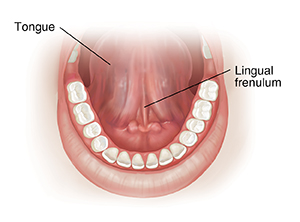Tongue-Tie (Ankyloglossia)
Tongue-tie (ankyloglossia) is a problem with a thin strip of tissue under the tongue. This tissue is called the lingual frenulum. It connects from the underside of the tongue to the floor of the mouth. You can see it if you look under your tongue in a mirror. Some children are born with a lingual frenulum that is too short and thick, which may cause problems with speech and feeding. In other cases, it may not cause a problem at all.

Understanding tongue-tie
The lingual frenulum may attach to the tip of the tongue instead of lower down under the tongue. The tongue then can’t move normally. Your child may have trouble sticking their tongue out, moving it from side to side, or bending it to touch the upper teeth. The tongue often has a notch at its tip. These problems can cause trouble with feeding as a baby and speaking as your child gets older.
Tongue-tie is different in each child. It can range from mild to serious.
What causes tongue-tie?
The exact cause of tongue-tie is unknown. Tongue-tie runs in some families and tends to occur more in males. Your child may have a higher risk for tongue-tie if you or other family members had it.
Symptoms of tongue-tie
Many babies don’t have any symptoms. Others may have problems such as:
Once your baby gets older:
-
A gap between the bottom two front teeth.
-
Trouble making certain sounds, such as t, d, z, s, th, n, and l.
In rare cases, a child with tongue-tie may have other problems, like cleft lip or cleft palate. These can cause other symptoms.
In later years, tongue-tie can make it hard for your child to do some activities, such as lick an ice cream cone, play a wind instrument, or kiss.
Diagnosing tongue-tie
Tongue-tie may be found when looking for causes of a baby’s breastfeeding problems. A doctor will ask about your child’s medical history and give them a physical exam. The doctor will carefully check your child’s tongue and its movements. They might advise that your child see a specialist who treats tongue-tie. For example, they might suggest you see an ear, nose, and throat doctor or a pediatric dentist.
Treatment for tongue-tie
Your child may not need treatment if they have no symptoms or mild symptoms. In some children, most or all symptoms go away over time. As a child grows, their mouth grows too. This may cause the frenulum to be less of a problem. This may solve the problem of mild tongue-tie, or your child may find ways to work around the problem. Symptoms may be less likely to go away if your child has more serious tongue-tie.
If your child has trouble breastfeeding, your doctor may advise working with a breastfeeding specialist (lactation consultant). If that doesn’t work, your child may need surgery.
If your child is older, they may need to see a speech therapist. This specialist will test your child’s speech. The specialist may advise speech therapy or advise surgery.
A simple surgery called a frenotomy (also called a frenulotomy) is a treatment that works well for many children. It may be done with a sharp instrument or a laser. A doctor can often do this procedure in the office. A cut is made in the lingual frenulum, allowing the tongue to move normally. Your child might need to see a speech therapist or other specialist after a frenotomy. This can help them learn how to retrain the muscles of the tongue.
Another option is frenuloplasty. This also involves lengthening the front part of the tongue.
When to contact the doctor
Contact your child’s doctor or a breastfeeding specialist if your child is having trouble breastfeeding. If you believe your child is having problems making sounds, see your child’s doctor or a speech pathologist.